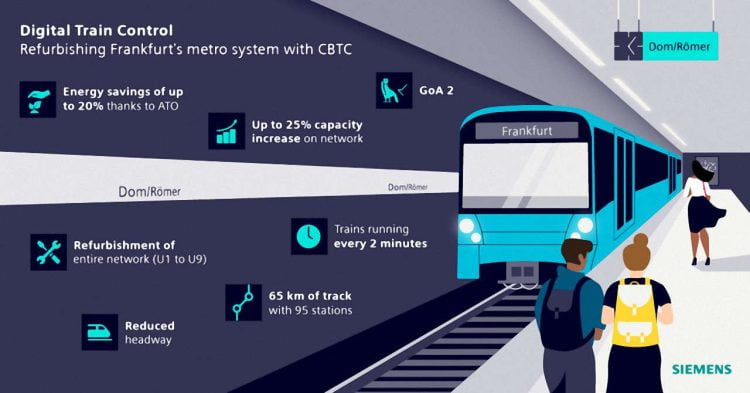Siemens Mobility has been awarded a contract by VGF, Frankfurt's public transport provider, to install a Communications-Based Train Control (CBTC) system to modernise the Frankfurt Metro.
On Monday, 13 December 13, Tarek Al-Wazir, the Hessian Minister for Economic Affairs, Energy, Transport and Housing, officially granted funding of €95.5 million to the VGF to co-finance the project, together with the Federal Government and the state of Hesse.
The contract is for digital CBTC technology replace the conventional train control system currently used in its metro and tram network with a new, state-of-the-art digital system, the “Digital Train Control (DTC) System Frankfurt”, which is the name used by the VGF for its digital CBTC train control system.
All nine lines of Frankfurt's metro system are to be converted to digital train control by 2031. The conversion will begin with the B route (lines U4 and U5), including the U5 extension to the Europaviertel, and is currently planned to begin operation in 2025.

Frankfurt's Cabinet Member for Transport, Stefan Majer, said “The digitalization of the train control system with the ‘DTC' is a project that will not only have outstanding importance for Frankfurt's public transport network in the coming years but will also make the city and the VGF leaders nationwide.”
“The DTC will mark the first time a Communication Based Train Control System is used in a German city.” The technology will wirelessly and digitally link metros and trams with one another in real time. This will allow trains to operate at shorter intervals and, in turn, enable the VGF to significantly expand its capacity without having to convert or build new rail lines or stations.
Stefan Majer emphasized the project's possible connection with ‘Frankfurt MIND(+)', a parallel project. “The DTC can be linked to individual traffic via the city's central traffic computer. This would make fully integrated traffic control possible for the first time in a major urban centre in Frankfurt and Germany – nothing less than a milestone in the country's mobility transition.”
On the planned awarding of the contract, VGF CEO Michael Rüffer said “We'll be converting the train control system for our entire metro network to DTC, followed by the tram network. To achieve this, we need a powerful and competent partner – which we've found in Siemens Mobility. We're especially pleased to be continuing a partnership with Siemens that was already a successful model back in 1899, when Frankfurt put 181 classic Siemens trams into service.”
Andre Rodenbeck, CEO Rail Infrastructure at Siemens Mobility, said “More than 40 cities worldwide already trust our Trainguard MT CBTC solution. We are proud that we can use this innovative technology for the first time in Germany at the VGF. Our technology combines maximum availability, maximum line capacity, shortened intervals, and up to 20% less energy consumption with the highest possible level of safety. In the future, metro trains in the Frankfurt network will be able to run every two minutes.”
CBTC will allow the VGF to increase the capacity and efficiency of its routes, particularly in the underground sections. It enables trains to operate with just the braking distance between them, rather than in fixed block sections as at present, which makes it possible to run trains at shorter intervals. That will enable the VGF to increase its capacity by up to 25 percent without having to expand or construct new lines.